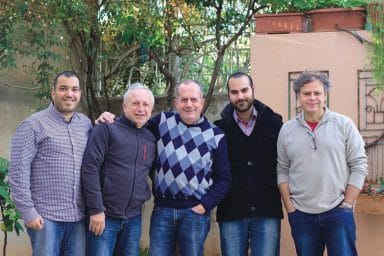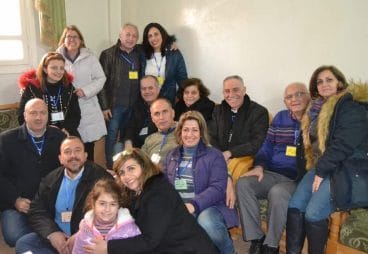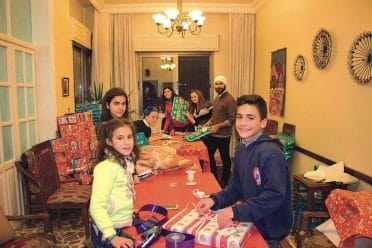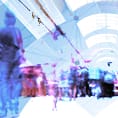
Robert Chelhod (centre) with the focolarini in Aleppo
 What can we do for Syria today? “For those who have faith, continue to pray. And you can bet with the Syrians that the country is alive. We need support in Syria. Not only from the economic point of view, which is certainly vital, but in believing that with us, this country, the cradle of civilisation, can be reborn. That peace is still possible. We need to know that the world feels our suffering, that of a country that is disappearing.” You coordinate onsite the social projects funded through AMU. How does this come about? “The projects range from aid for food to schooling. Then there is healthcare aid since public healthcare is unable to meet the minimum standards of assistance due to the lack of doctors, medicines and instruments. Besides help for families, there are more stable projects: two after-school organisations in Damascus and Homs with 100 children each, Christians and Muslims; two specific healthcare projects for the treatment of cancer and for dialysis; and a school for the deaf and dumb children, that was already operating before the war. These projects offer the possibility of work for many local youths. The employment issue is fundamental. We are dreaming in the near future of the possibility of working on microcredit to relaunch the activities. Aleppo was a city brimming with merchants who today would restart, but the initial capital is lacking.”
What can we do for Syria today? “For those who have faith, continue to pray. And you can bet with the Syrians that the country is alive. We need support in Syria. Not only from the economic point of view, which is certainly vital, but in believing that with us, this country, the cradle of civilisation, can be reborn. That peace is still possible. We need to know that the world feels our suffering, that of a country that is disappearing.” You coordinate onsite the social projects funded through AMU. How does this come about? “The projects range from aid for food to schooling. Then there is healthcare aid since public healthcare is unable to meet the minimum standards of assistance due to the lack of doctors, medicines and instruments. Besides help for families, there are more stable projects: two after-school organisations in Damascus and Homs with 100 children each, Christians and Muslims; two specific healthcare projects for the treatment of cancer and for dialysis; and a school for the deaf and dumb children, that was already operating before the war. These projects offer the possibility of work for many local youths. The employment issue is fundamental. We are dreaming in the near future of the possibility of working on microcredit to relaunch the activities. Aleppo was a city brimming with merchants who today would restart, but the initial capital is lacking.”  Instead many continue to leave… “The exodus, especially of the Christians, is irreversible. The reason is the insecurity, and lack of jobs. The Church suffers in this land which was a land of Christians before the arrival of Islam. And it is trying to do what is possible to help and support all this. But there are few resources. Most of the youths are in the army. You may find some university students, or kids. But the 25-40 age bracket is inexistent. In the city of Aleppo, the estimated further drop of Christians is 140,000 from 130,000, while many Muslims have arrived, evacuated from their destroyed cities.” What impact does this have on interreligious dialogue? “In Aleppo the Christians considered themselves somewhat like the élite of the country. With the war, since the Muslim zones were hit, many took refuge in the Christian zones. So the Christians opened out to the Muslims, and had to accept them. The Latin Bishop Emeritus of Aleppo, Bishop Armando Bortolaso, during the war told me: “Now’s the time to be real Christians.” At the same time the Muslims have got to know the Christians personally. They were touched by the concrete help. There are negative and positive aspects. The positive one is that this war has made us Syrians closer with one another.” Source: Citta’ Nuova Magazine
Instead many continue to leave… “The exodus, especially of the Christians, is irreversible. The reason is the insecurity, and lack of jobs. The Church suffers in this land which was a land of Christians before the arrival of Islam. And it is trying to do what is possible to help and support all this. But there are few resources. Most of the youths are in the army. You may find some university students, or kids. But the 25-40 age bracket is inexistent. In the city of Aleppo, the estimated further drop of Christians is 140,000 from 130,000, while many Muslims have arrived, evacuated from their destroyed cities.” What impact does this have on interreligious dialogue? “In Aleppo the Christians considered themselves somewhat like the élite of the country. With the war, since the Muslim zones were hit, many took refuge in the Christian zones. So the Christians opened out to the Muslims, and had to accept them. The Latin Bishop Emeritus of Aleppo, Bishop Armando Bortolaso, during the war told me: “Now’s the time to be real Christians.” At the same time the Muslims have got to know the Christians personally. They were touched by the concrete help. There are negative and positive aspects. The positive one is that this war has made us Syrians closer with one another.” Source: Citta’ Nuova Magazine

 We publish summary of the New City’s interview with Robert Chelhod, a native of Aleppo, Syria, and local coordinator of the AMU projects. His hopes for the rebirth of his country.
We publish summary of the New City’s interview with Robert Chelhod, a native of Aleppo, Syria, and local coordinator of the AMU projects. His hopes for the rebirth of his country.


0 Comments